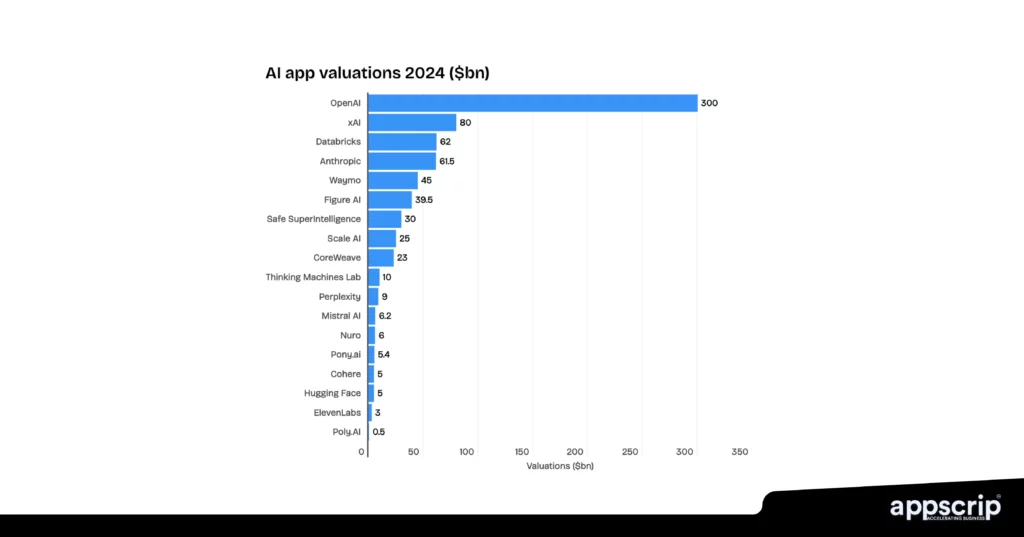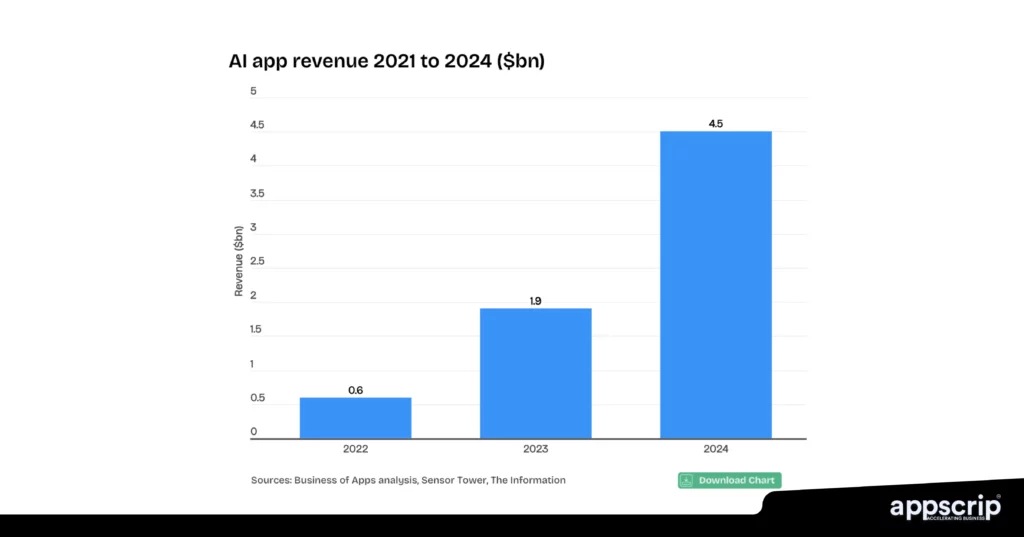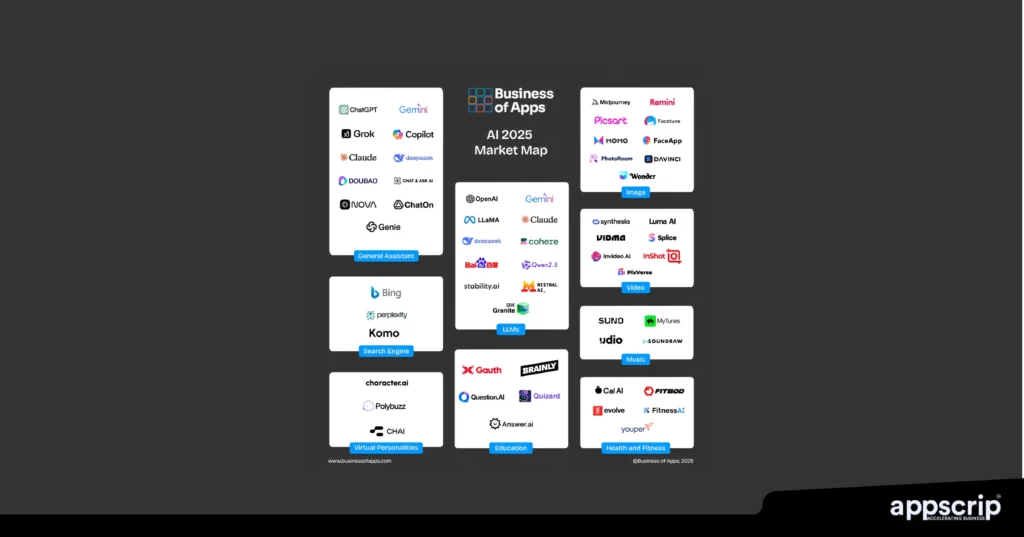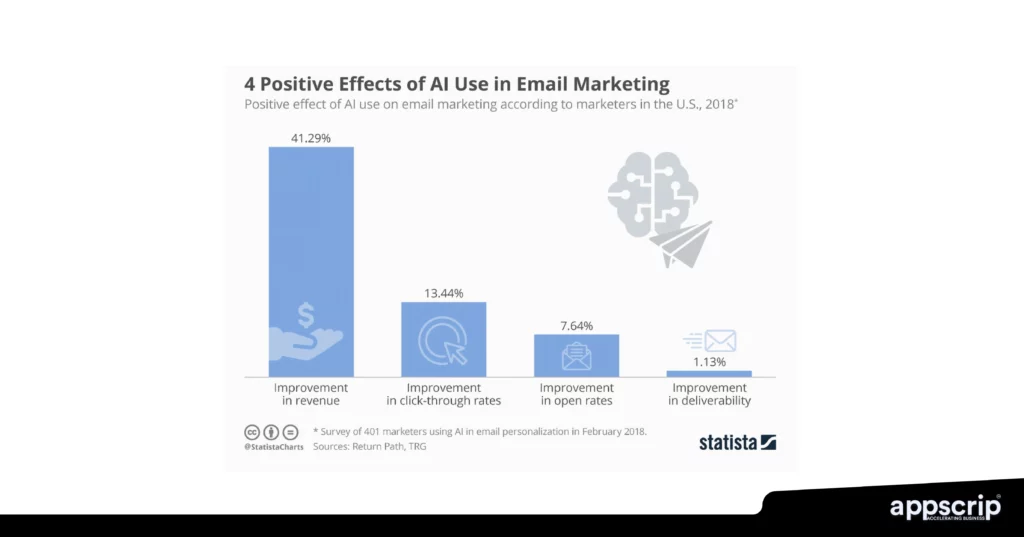AI is not alien, it’s the driving drive reshaping how digital merchandise are imagined, constructed, and scaled. For app improvement firms and tech-savvy companies, AI represents the stairway to raise person experiences, optimize improvement processes, and acquire a aggressive edge.
Our weblog will empower everybody from builders and designers to purchasers in ride-hailing, telemedicine, e-commerce, and past. It’s not nearly understanding AI, however realizing learn how to use AI judiciously and profitably in app improvement.
Domains Touched By AI In App Improvement
From customized product suggestions in e-commerce to real-time route optimization in logistics, AI is reworking each area. In ride-hailing, it’s bettering ETAs and security. In telemedicine, it’s aiding analysis. In relationship and social apps, it’s fuelling smarter matchmaking and content material moderation.
Regardless of your business, AI is reshaping customers’ expectations. Learn on and we’ll present you learn how to meet — and exceed — these expectations utilizing AI within the app improvement journey.

Key Functions of AI in App Improvement
Personalization
AI has turn out to be a key driver of private experiences in apps. From Netflix recommending films based mostly on viewing historical past to Amazon suggesting merchandise tailor-made to particular person preferences, AI leverages person knowledge to supply customised content material and companies.
A survey by Accenture reveals that 91% of shoppers usually tend to store with manufacturers that present related suggestions. Personalisation not solely enhances person engagement but additionally will increase conversion charges, making it a helpful characteristic in fashionable apps.
Pure Language Processing (NLP) and Voice Recognition
NLP has revolutionised how customers work together with apps by voice instructions and conversational interfaces. Digital assistants like Siri, Google Assistant, and Alexa utilise AI-powered NLP to grasp and reply to voice queries in actual time.
Moreover, AI chatbots have gotten customary throughout customer support platforms, serving to firms deal with queries 24/7. The truth is, Gartner predicts that by 2027, 25% of firms will combine digital buyer assistants to deal with buyer interactions.
Picture and Video Recognition
AI’s capacity to analyse photos and movies is reworking apps in industries like safety, social media, and healthcare. Apps like Instagram and Snapchat use AI-driven filters to reinforce person images, whereas safety apps use object recognition to detect suspicious actions.
AI’s capacity to course of visible knowledge opens up a myriad of alternatives, from automated video enhancing to diagnostic instruments in healthcare apps, and even inventive instruments like an AI picture generator or an AI video generator that customers can use to supply beautiful visuals effortlessly.
Predictive Analytics
AI’s energy lies in its capacity to foretell person behaviour and make data-driven selections. Predictive analytics permits apps to forecast future developments based mostly on historic knowledge, serving to companies optimise their choices.
As an example, predictive algorithms in apps like Spotify suggests playlists based mostly on listening historical past, whereas well being apps can predict potential well being dangers by analysing person patterns. This AI functionality is essential in delivering well timed and related insights to customers.
Automation and Testing
AI can considerably pace up the app improvement course of by automating routine duties like testing and debugging. AI-powered instruments can establish bugs, counsel code optimizations, and even generate code, decreasing the burden on builders.
In keeping with a report by McKinsey, firms utilizing AI in improvement processes report as much as a 40% discount in time-to-market.

Advantages of AI in App Improvement
Improved Person Expertise
AI’s capacity to analyse person behaviour and adapt accordingly ends in a extra personalised and intuitive person expertise. Whether or not by smarter suggestions or voice-controlled assistants, AI enhances how customers work together with apps, making them extra user-friendly and responsive.
Effectivity in Improvement
AI instruments not solely speed up improvement but additionally minimise human error. AI-assisted coding platforms assist builders write cleaner code, whereas automated testing instruments guarantee quicker iteration cycles. This elevated effectivity may end up in quicker time-to-market and lowered improvement prices.
Scalability
AI-driven automation permits apps to deal with giant datasets and person bases with out compromising efficiency. Cloud-based AI options allow real-time knowledge processing and scaling, making it simpler for apps to develop with out going through efficiency bottlenecks.
Predictive Analytics
AI permits predictive analytics, serving to apps forecast person wants and developments. For instance, Spotify makes use of AI to counsel music based mostly on listening habits, and well being apps predict dangers based mostly on person knowledge. This results in smarter decision-making and improved person engagement.
Price Discount
AI automates repetitive duties, decreasing improvement time and labour prices. Automated testing and optimization instruments assist organisations minimise bills, permitting builders to deal with innovation relatively than routine duties. It’s also possible to know the precise price of app improvement utilizing an app price estimator.
Professionals and Cons of AI in App Improvement
| Professionals | Cons |
| Elevated Improvement Effectivity: AI automates duties like coding, testing, and debugging, decreasing human error and dashing up the event course of, which shortens time-to-market. | Complexity and Studying Curve: Implementing AI requires specialised expertise in machine studying and knowledge science, making it troublesome for builders who lack expertise in these areas. |
| Enhanced Personalization: AI helps create personalised person experiences by analysing person knowledge and preferences, resulting in extra related content material suggestions and improved person satisfaction. | Information Privateness and Safety Considerations: AI depends closely on person knowledge for personalization, which raises considerations about knowledge safety and privateness, particularly with rising laws like GDPR and CCPA. |
| Price Discount: By automating repetitive duties, AI reduces the necessity for guide labour, reducing improvement prices and permitting sources to be allotted extra strategically. | Upkeep and Updates: AI fashions want steady tuning and updates to stay efficient. This requires ongoing sources and experience to take care of, rising long-term prices. |
AI Functions Throughout Fashionable App Domains
Experience-Hailing Apps
- Route Optimization: AI will counsel most effective routes based mostly on real-time visitors and historic knowledge.
- Demand Prediction: Forecasts experience demand in particular areas to handle driver provide and pricing.
- Driver Efficiency Monitoring: Analyzes driving habits to enhance security and effectivity.
E-commerce Apps
- Product Suggestions: AI will present options based mostly on looking and buy historical past.
- Dynamic Pricing: Adjusts costs in real-time as per demand, stock, and competitors.
- AI Chatbots: For immediate, automated buyer help 24/7.
Telemedicine Apps
- Symptom Checking & Prognosis Help: Makes use of AI to interpret signs and counsel subsequent steps.
- Good Scheduling: Routinely books appointments based mostly on availability and urgency.
- Affected person Prioritization: Triages instances utilizing severity prediction algorithms.
Logistics Apps
- Fleet & Route Optimization: AI reduces supply instances and gasoline utilization with sensible routing.
- Actual-Time Monitoring & Delay Prediction: Predicts delays based mostly on visitors and environmental knowledge.
- Warehouse Automation: Manages stock and order fulfilment extra effectively.
Relationship Apps
- AI Matchmaking: Matches customers based mostly on behavioral knowledge and preferences.
- Content material Personalization: Recommends profiles, bios, and ice-breakers suited to the person.
- Pretend Profile Detection: Flags bots or suspicious exercise utilizing sample recognition.
Messaging & Social Media Apps
- Content material Moderation: Filters out dangerous or inappropriate content material utilizing NLP and laptop imaginative and prescient.
- Good Replies & Translation: Suggests context-aware responses and helps multilingual communication.
- Feed Personalization: Ensures content material feed satisfies particular person person habits and pursuits.

Challenges of Implementing AI in App Improvement
Whereas AI affords immense potential, companies—particularly in app improvement—should navigate key challenges earlier than implementation. Let’s dive into essentially the most urgent considerations and learn how to mitigate them.
Price vs. ROI: Is AI Definitely worth the Funding?
Problem:
Many companies marvel if the returns justify the prices as AI improvement requires important funding in infrastructure, expertise, and ongoing upkeep.
Answer:
- Begin small: Implement AI in phases (e.g., chatbots earlier than full-scale predictive analytics).
- Concentrate on high-impact areas: AI-driven personalization in e-commerce or route optimization in logistics can ship fast ROI.
- Leverage cloud-based AI: Reduces upfront prices with pay-as-you-go fashions (e.g., AWS AI, Google Cloud AI).
Business-Particular ROI Examples:
- Experience-hailing: AI-powered dynamic pricing will increase income.
- Telemedicine: AI diagnostics scale back operational prices.
- E-commerce: Advice engines enhance gross sales by 20% to 30%.
Information Privateness & Compliance: Navigating Rules
Problem:
AI depends on huge datasets, elevating considerations about GDPR, HIPAA (for healthcare), and CCPA compliance.
Answer:
- Anonymization & encryption: Defend person knowledge whereas coaching AI fashions.
- On-device AI processing: Minimizes knowledge switch (e.g., Apple’s Core ML).
- Compliance-first AI frameworks: Use instruments like IBM Watson (HIPAA-compliant AI for telemedicine).
Business-Particular Issues:
- Relationship/Social Media: Guarantee AI moderation respects person privateness.
- Logistics: Safe real-time monitoring knowledge towards breaches.
- Messaging: Finish-to-end encryption with AI-driven spam filters.
Integration with Legacy Techniques: Bridging the Hole
Problem:
Many companies even now work on legacy and outdated techniques that aren’t AI-ready, resulting in compatibility points.
Answer:
- API-first AI options: Plug-and-play AI companies (e.g., Firebase ML, Microsoft Cognitive Providers).
- Hybrid AI fashions: Run light-weight AI on edge gadgets whereas syncing with cloud.
- Middleware options: Instruments like MuleSoft assist combine AI with legacy ERP/CRM techniques.
Business-Particular Use Instances:
- Logistics: AI-powered warehouse administration built-in with previous stock techniques.
- Experience-hailing: AI fraud detection working alongside legacy fee gateways.
Moral Implications & Bias in AI: Constructing Truthful Techniques
Problem:
AI can inherit biases from coaching knowledge, resulting in unfair outcomes (e.g., biased hiring algorithms or discriminatory mortgage approvals).
Answer:
- Various coaching datasets: Guarantee illustration throughout demographics.
- Explainable AI (XAI): Instruments like LIME & SHAP assist interpret AI selections.
- Common bias audits: Repeatedly take a look at AI fashions for equity.
Business-Particular Moral Considerations:
- Relationship Apps: Keep away from reinforcing racial/gender biases in matchmaking.
- Telemedicine: Stop AI diagnostics from favoring sure demographics.
- E-commerce: Guarantee AI pricing doesn’t discriminate towards customers.

Instruments and Platforms for AI in App Improvement
AI Improvement Platforms: Builders can use platforms like Google AI, Microsoft Azure AI, and IBM Watson to combine AI capabilities into their apps. These platforms provide instruments for ML, NLP, and laptop imaginative and prescient, permitting builders to construct AI-powered apps with ease.
AI Libraries and Frameworks: Open-source libraries like TensorFlow and PyTorch present the instruments wanted to construct customized AI fashions. These frameworks are broadly utilized by builders to create AI functions starting from picture recognition to suggestion engines.
No-Code/Low-Code AI Instruments: For builders with restricted AI experience, no-code and low-code AI instruments like Lobe and MonkeyLearn make it simpler to combine AI functionalities with out writing complicated code.
Pre-Skilled Fashions and APIs: Builders can pace up AI integration by leveraging pre-trained fashions and APIs from platforms like OpenAI GPT, IBM Watson, and Google Imaginative and prescient. These options enable builders to deploy AI options with out having to construct fashions from scratch.
How AI Enhances the App Improvement Lifecycle
AI is reshaping how apps are constructed by smoothening processes, bettering accuracy, reducing improvement time, and enabling extra data-driven selections. Right here’s a stage-by-stage breakdown of how AI enhances the whole app improvement lifecycle:
1. Ideation & Planning
AI-Powered Market Evaluation
AI instruments can scan huge quantities of knowledge — app retailer developments, competitor options, person opinions, and business studies — to establish demand gaps and have alternatives. This helps groups validate concepts earlier than investing closely in improvement.
Development Forecasting
AI fashions can predict future person behaviors and market developments, enabling proactive planning. For instance, in e-commerce, AI could forecast desire for sustainable merchandise, information characteristic planning for inexperienced badges or eco-filtered searches.
Use Case Prioritization
Utilizing AI-based predictive fashions, product managers can estimate the influence of proposed options (when it comes to engagement, retention, or monetization) and prioritize helpful ones.
2. UI/UX Design
AI-Generated Wireframes & Prototypes
AI instruments like Uizard or Galileo can convert textual inputs into design mockups. This accelerates early design phases and gives a speedy approach to iterate and validate person flows.
Personalised UX on the Design Stage
Designers can use AI to seek out how totally different person personas would possibly work together with an interface, entailing design of adaptive experiences early on.
A/B Testing Optimization
AI can dynamically take a look at a number of UI variations in real-time and mechanically steer visitors to high-performing designs with out guide setup.
3. Improvement
AI-Assisted Coding
AI-based instruments like GitHub Copilot or Tabnine assist builders write boilerplate code, counsel total blocks, and even auto-complete logic-specific snippets. This dramatically will increase productiveness and reduces bugs.
Code High quality & Safety
AI can analyze the codebase in actual time to flag inefficiencies, code smells, and safety vulnerabilities. Instruments like DeepCode use ML fashions educated on giant codebases to supply context-aware options.
Clever API Integration
AI can auto-generate boilerplate code for third-party API integrations by analyzing documentation and inferring utilization patterns, making exterior service integration quicker and fewer error-prone.
4. Testing & High quality Assurance
AI-Powered Take a look at Case Technology
AI can mechanically generate take a look at instances by analyzing person habits and app flows, guaranteeing protection of real-world use situations that guide testing could miss.
Visible Testing
Laptop imaginative and prescient fashions can evaluate UI snapshots throughout builds and flag discrepancies — even refined ones — that may not break performance however influence person expertise.
Bug Detection & Root Trigger Evaluation
AI instruments can monitor logs, person periods, and crash studies to detect points quicker and counsel essentially the most possible trigger, decreasing debugging time considerably.
5. Deployment & Monitoring
Predictive Scaling & Infrastructure Optimization
AI can analyze utilization patterns and predict visitors spikes, enabling the app to auto-scale cloud infrastructure dynamically. This reduces downtime and optimizes useful resource prices.
Actual-Time Efficiency Monitoring
AI instruments monitor metrics like load time, CPU utilization, and error charges in real-time, mechanically flagging anomalies and alerting the dev group earlier than points escalate.
Person Habits Evaluation Put up-Launch
Put up-deployment, AI fashions assist in figuring out characteristic adoption, person drop-off factors, and engagement bottlenecks. This permits product groups to iterate based mostly on precise utilization insights relatively than assumptions.
6. Steady Studying & Iteration
Suggestions Loop Optimization
AI can mine help tickets, person opinions, and in-app suggestions to detect widespread themes and ache factors. This knowledge feeds again into product selections and have enhancements.
Mannequin-Primarily based Personalization
As extra customers interact with the app, AI fashions proceed to study and adapt — fine-tuning suggestions, content material supply, or interface components mechanically, with out guide updates.
Autonomous Experimentation
Some platforms use AI to autonomously run small-scale experiments (like structure modifications or button placements) and implement essentially the most profitable variant with out human intervention.
Abstract of Lifecycle Enhancements by AI
| Stage | Key AI Advantages |
| Ideation & Planning | Market validation, characteristic prioritization |
| Design | AI-generated prototypes, persona-based UX modeling |
| Improvement | Code technology, auto-integration, code evaluation |
| Testing & QA | Good take a look at technology, visible testing, quick bug detection |
| Deployment | Predictive scaling, real-time monitoring |
| Iteration | Automated suggestions evaluation, steady personalization |
Future Traits in AI for App Improvement
Generative AI: AI-generated content material, corresponding to textual content, photos, and even code, is turning into extra prevalent in apps. Apps like DALL-E use generative AI options to create paintings, whereas others are experimenting with AI-generated music and writing.
AI in AR and VR: AI is predicted to play a key position in enhancing augmented actuality (AR) and digital actuality (VR) experiences. From personalised digital environments to AI-powered real-time analytics in AR apps, the probabilities are limitless.
Edge AI: As cell gadgets turn out to be extra highly effective, edge AI, the place AI processes happen regionally on the machine relatively than within the cloud, is gaining traction. This development will allow quicker, extra environment friendly AI-powered apps that don’t rely closely on web connectivity.
Conclusion: AI In App Improvement
AI is not an choice, however it’s the inspiration of next-generation apps. Integrating AI is not going to solely lower prices and speed up improvement however can delight customers with options that really feel clever, intuitive, and private.
Appscrip builds clever, scalable, and data-driven apps throughout ride-hailing, e-commerce, healthcare, logistics, social media domains and extra. With experience in AI and a monitor file of profitable apps, we don’t simply ship code — we ship sensible, future-ready options.
Whether or not you’re an entrepreneur or startup trying to disrupt, or an enterprise able to optimize, we deliver the AI edge that fashionable apps require. Get in contact to know extra.

